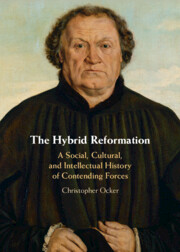Book contents
- The Hybrid Reformation
- The Hybrid Reformation
- Copyright page
- Additional material
- Dedication
- Contents
- Preface
- Part I Indifference and Ambiguity
- Part II Medieval Protestants
- 4 A Reformation Stake in Medieval Thinking
- 5 The Trouble with Ockham
- 6 Wegestreit
- Part III Interpretation beyond Borders
- Bibliography
- Index
6 - Wegestreit
Via moderna, Via antiqua, Wycliffites
from Part II - Medieval Protestants
Published online by Cambridge University Press: 30 September 2022
- The Hybrid Reformation
- The Hybrid Reformation
- Copyright page
- Additional material
- Dedication
- Contents
- Preface
- Part I Indifference and Ambiguity
- Part II Medieval Protestants
- 4 A Reformation Stake in Medieval Thinking
- 5 The Trouble with Ockham
- 6 Wegestreit
- Part III Interpretation beyond Borders
- Bibliography
- Index
Summary
Ockham is often described as the origin of the via moderna, “a current way” in competition with the via antiqua, “an old way.” These terms are often used to structure late medieval intellectual history around a new “nominalism” and a reactionary “realism.” But they are misleading. The “conflict of the ways” (Wegestreit in German historiography) only took definite shape two generations after Ockham’s death. It was prompted not by “nominalism” but by an aggressive, “hyper-realism” taught by John Wyclif. Another related but separate and equally important tension was also at play, between the analytical pedagogy encouraged by a prevalent terminism and a more expository commentary style. This changes the way we must see the force of the “conflict of the ways” in intellectual life. It becomes an illustration of a central quality in all knowledge production: the ludic culture of the schools. Luther, rather than being a nominalist, provides eloquent testimony to scholastic playfulness, an essential quality of a long, hybrid Reformation.
Keywords
- Type
- Chapter
- Information
- The Hybrid ReformationA Social, Cultural, and Intellectual History of Contending Forces, pp. 126 - 154Publisher: Cambridge University PressPrint publication year: 2022

